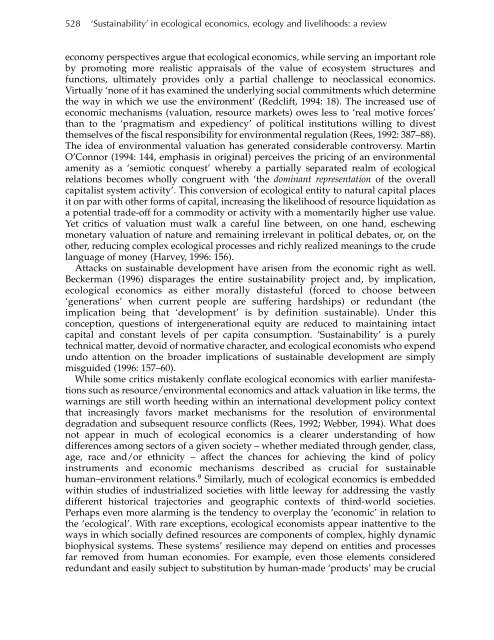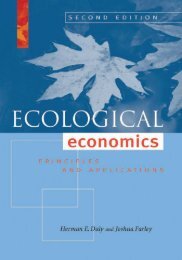2FGJN3
2FGJN3
2FGJN3
- No tags were found...
Create successful ePaper yourself
Turn your PDF publications into a flip-book with our unique Google optimized e-Paper software.
528 ‘Sustainability’ in ecological economics, ecology and livelihoods: a revieweconomy perspectives argue that ecological economics, while serving an important roleby promoting more realistic appraisals of the value of ecosystem structures andfunctions, ultimately provides only a partial challenge to neoclassical economics.Virtually ‘none of it has examined the underlying social commitments which determinethe way in which we use the environment’ (Redclift, 1994: 18). The increased use ofeconomic mechanisms (valuation, resource markets) owes less to ‘real motive forces’than to the ‘pragmatism and expediency’ of political institutions willing to divestthemselves of the fiscal responsibility for environmental regulation (Rees, 1992: 387–88).The idea of environmental valuation has generated considerable controversy. MartinO’Connor (1994: 144, emphasis in original) perceives the pricing of an environmentalamenity as a ‘semiotic conquest’ whereby a partially separated realm of ecologicalrelations becomes wholly congruent with ‘the dominant representation of the overallcapitalist system activity’. This conversion of ecological entity to natural capital placesit on par with other forms of capital, increasing the likelihood of resource liquidation asa potential trade-off for a commodity or activity with a momentarily higher use value.Yet critics of valuation must walk a careful line between, on one hand, eschewingmonetary valuation of nature and remaining irrelevant in political debates, or, on theother, reducing complex ecological processes and richly realized meanings to the crudelanguage of money (Harvey, 1996: 156).Attacks on sustainable development have arisen from the economic right as well.Beckerman (1996) disparages the entire sustainability project and, by implication,ecological economics as either morally distasteful (forced to choose between‘generations’ when current people are suffering hardships) or redundant (theimplication being that ‘development’ is by definition sustainable). Under thisconception, questions of intergenerational equity are reduced to maintaining intactcapital and constant levels of per capita consumption. ‘Sustainability’ is a purelytechnical matter, devoid of normative character, and ecological economists who expendundo attention on the broader implications of sustainable development are simplymisguided (1996: 157–60).While some critics mistakenly conflate ecological economics with earlier manifestationssuch as resource/environmental economics and attack valuation in like terms, thewarnings are still worth heeding within an international development policy contextthat increasingly favors market mechanisms for the resolution of environmentaldegradation and subsequent resource conflicts (Rees, 1992; Webber, 1994). What doesnot appear in much of ecological economics is a clearer understanding of howdifferences among sectors of a given society – whether mediated through gender, class,age, race and/or ethnicity – affect the chances for achieving the kind of policyinstruments and economic mechanisms described as crucial for sustainablehuman–environment relations. 9 Similarly, much of ecological economics is embeddedwithin studies of industrialized societies with little leeway for addressing the vastlydifferent historical trajectories and geographic contexts of third-world societies.Perhaps even more alarming is the tendency to overplay the ‘economic’ in relation tothe ‘ecological’. With rare exceptions, ecological economists appear inattentive to theways in which socially defined resources are components of complex, highly dynamicbiophysical systems. These systems’ resilience may depend on entities and processesfar removed from human economies. For example, even those elements consideredredundant and easily subject to substitution by human-made ‘products’ may be crucial



